#proto slavic
Text
the word "hlad": *exists*
me: what on earth could this mean
dictionary: it means "hunger"
me: ohh right, czech doesnt have "g" (-> h) and also remember liquid metathesis haha so it makes sense that Proto Slavic *goldъ evolved into Russian голод gólod and Czech hlad! :D
2 hours later
the word "hlas": *exists*
me: what on earth could this m-
#. SCREAMING#. once i memorise all the sound laws it's gonna be so over for you guys#. (addressing the slavic languages)#. this is so funny to me. you will never guess what hlas is in russian.#. it's голос gólos. that's right. from proto slavic golsъ#. and with this i wish you a good night <3#učím se česky#langblr#lingblr#proto slavic#czech#russian#slavic languages#l#r.txt
18 notes
·
View notes
Text
The word for “eye” in Proto-Slavic and its daughter languages:
Proto-Slavic *oko
Belarusian: око
Ukrainian: око
Old Church Slavonic: ⱁⰽⱁ (oko)
Bulgarian: око
Croatian: oko
Slovene: oko
Czech: oko
Polish: oko
Slovak: oko
Polabian: våt’ü
¯\_(ツ)_/¯
#linguistics#proto slavic#slavic languages#polabian#yes this is a descendant of the proto slavic form#and it is regular
106 notes
·
View notes
Text
Months in Ukrainian
january - січень (síchen'), related to "сікти" ("to cut"), referring to cutting down trees in preparation of agricultural land
february - лютий (lyútyy), "cruel", "fierce", referring to the fierce, harsh winter weather and cold
march - березень (bérezen'), related to "береза" ("birch tree")
april - квітень (kvíten'), related to "квітка" ("flower")
may - травень (tráven'), related to "трава" ("grass")
june - червень (chérven'), related to "червоний" ("red"), referring to the manufacturing of red dye from insect larvae
july - липень (lýpen'), related to "липа" ("linden tree")
august - серпень (sérpen'), related to "серп" ("sickle"), referring to harvest
september - вересень (véresen'), related to "верес" ("heather flower")
october - жовтень (zhóvten'), related to "жовтий" ("yellow"), referring to yellow autumn foliage
november - листопад (lystopád), "leaf fall"
december - грудень (hrúden'), related to "груда" ("heap"), referring to heaps of frozen soil
#ukrainian in general is very descriptive but i love the month names in particular. yeah that sure is жовтень.#side note these all obviously have proto-slavic origins but im not nearly knowledgeable enough to go into that.#ukrainian#ukraine
677 notes
·
View notes
Text
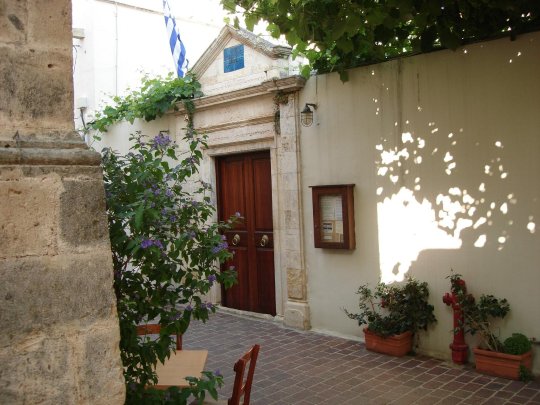
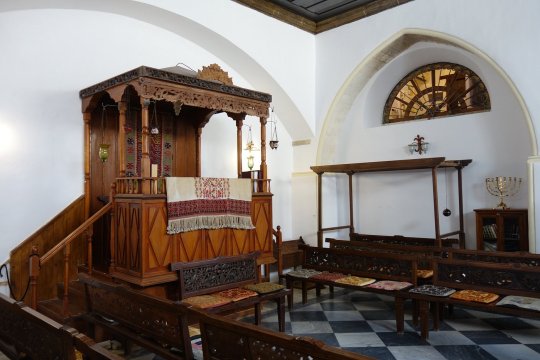
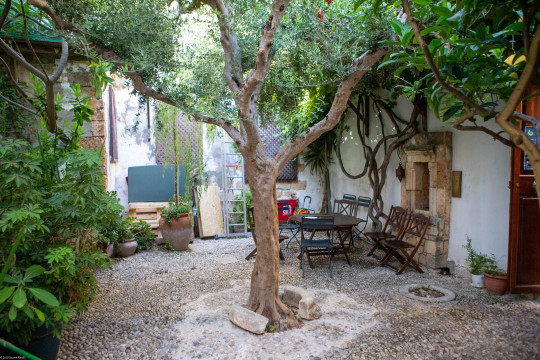
etz hayyim (“tree of life”) synagogue in chania, crete, greece. the building dates to the 14th-15th centuries, and was originally a venetian catholic church. it was acquired by chania's jewish community and converted into a synagogue in the late 17th century. chania's jews were deported due to the holocaust in 1944, after which the building remained abandoned until restoration in the 1990s.
romaniote jews are the oldest jewish community in europe and one of the oldest in the world, thought to have lived in and around present day greece since before 70 ce. they have their own liturgy that is unrelated to the more commonly used european ones (ashkenazic and sephardic).
#greece#architecture#interior#worship#jewish#romaniote#old & new#my posts#for all u Westerners 'rom' = constantinople referring to itself as the roman empire#so rome/italy is like 'west roman' constantinople/greece/anatolia is like 'east roman'#in the west its called 'byzantine' from 'byzantium' (proto-constantinople)#also it insinuates w roman empire was the 'real' roman empire (despite east lasting 1000 years longer)#in most mediterranean & w asian languages greece/greek is 'yunan/yawan/yavan' (from ionians) or 'rum/rom' (from roman)#in actual greek it's 'hellas'/'ellas' (from hellenic)#in georgian it's 'saberdzneti' for some reason but they also have their own names for a bunch of places#'greece' comes from the latin name 'graecia'#in a lot of slavic languages it's some variation of 'greece'. weird considering most were never/hardly under latin influence#if you think this is a lot just wait until u hear about the all the names for armenia#but yeah these guys were also in a lot of the balkans. if you're from the balkans and jewish you MAY have romaniote ancestry#(at least more recent romaniote ancestry than all other european jews)#not a guarantee though especially if you're ashkenazi#theres like. other jewish groups in europe that predated ashkenazi migration#most of them just got absorbed into the ashkenazi population
226 notes
·
View notes
Text

English is part of a large language family that includes French, Welsh, Polish, Persian, Greek, and Albanian. They stem from a common ancestor reconstructed as Proto-Indo-European. The cardinal numerals from 1 to 10 illustrate their relationship well. Click the image for a selection.
#historical linguistics#linguistics#language#etymology#english#latin#french#german#spanish#welsh#irish#sanskrit#persian#polish#russian#italian#gothic#proto-germanic#proto-celtic#proto-indo-iranian#proto-balto-slavic#lithuanian#ancient greek#albanian#icelandic
88 notes
·
View notes
Text
Words you didn’t know are related: gold, yellow, cholera, arsenic, yolk, and more!
The Proto-Indo-European language (the hypothesized original ancestor language of most modern languages in Europe and South Asia, hereafter abbreviated “PIE”) had a root *ǵʰelh₃- ‘yellow, green’.
Aside: How can this word refer to both ‘yellow’ and ‘green’? Historically, color terms in the world’s languages referred to a broader range of colors than they do today, and focused more on the texture…
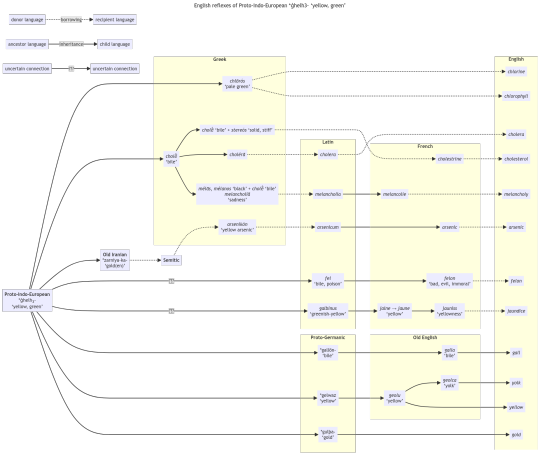
View On WordPress
#English#etymology#French#Greek#historical linguistics#historical reconstruction#Indo-European#Iranian#Latin#Latvian#Old English#Proto-Indo-European#Russian#Semitic#Slavic
46 notes
·
View notes
Text
I may be causing my own descent into insanity by trying to make a conlang based on real languages I don't speak..
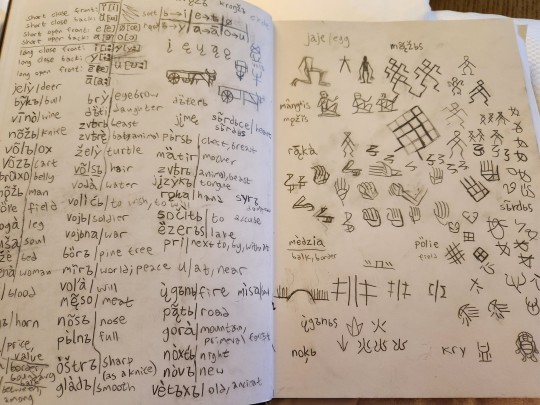
#I keep remaking the entire thing because I missed some major concept#proto slavic is really cool#but I'm monolingual#why am I doing this#conlang#linguistics#slavic#btw I know the tones are slightly off#don't worry about it
14 notes
·
View notes
Text
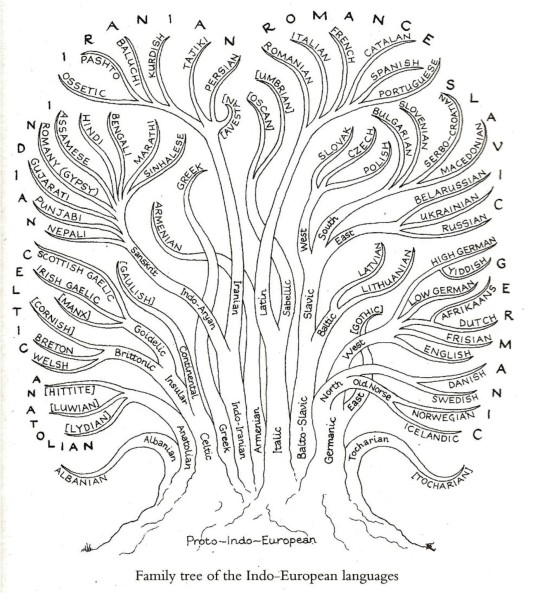
#language#languages#family tree#family tree of languages#proto indo european#where language comes from#know your roots#anatolian#celtic#romance#germanic#slavic#indian#iranian#did you know#how cool is that#language is fun#language is beautiful#spoken word#written words#evolution of language#something cool#linguistics#writers on tumblr#writerscommunity#where we came from#i just think they're neat
6 notes
·
View notes
Text

Genetic situation in East-Central Europe just prior to ethnogenesis of the Slavs, beginning of the Common Era.
Light Green merging with Orange and Dark Blue would eventually form the Slavs in what is now west Ukraine, south Belarus, and east Poland. Basically the Warsaw-Kyiv-Minsk Triangle is the ancient homeland (Urheimat) of the Slavs.
In the 4th century with the destruction of their Gothic overlords (who called the Slavs Veneti), Slavs allied with the Huns, whose raids would depopulate most of East-Central Europe and open lands for Slavs to settle as farmers.
7 notes
·
View notes
Text

World Map 500CE
The Great Migration Project (TGMP)
My linguistic project may have turned into a full-blown worldbuilding project that I am collaborating with my dear friend Aurora. She and I have decided to make two changes to the world.
Firstly, the Germanic tribe in southern Finland has mixed with the finnish culture, leading to a Finno-Germanic culture in the area (creating the Sweans)
Secondly, Aurora has created a Judeo-Slavic culture in Crimea (Yán-Máyim) to tell her aspect of the story of the Jewish during the diaspora (She's Jewish, btw, so pls do not murder us... wait, this is Tumblr, not TikTok/Reddit :D)
I'll share more as we continue to work on the project :)
#linguistics#conlang#historical linguistics#worldbuilding#conlanging#langblr#alternative#alternate history#finnish#proto germanic#germanic#germanic languages#jewish#slavic
15 notes
·
View notes
Text
I was just doing Anki and came across связь (rus; connection, relation) and was like wait that's awfully close to svaz (ces; union) and even has a similar meaning and lo and behold, связь, svaz and союз* all go back to the same proto indo european root, *h₂enǵʰ-. связь and svaz even share the same proto slavic root, *vę̄zàti.
*looked up союз too bc svaz means союз and i once again went wait that's also kinda close
16 notes
·
View notes
Text
I adore the fact that while one of the earliest phonological changes in the Proto-Indo-European language was the elimination of -tk-, -dg-type clusters (because you know, those were unpronounceable even for the users of a language that contained such a banger of a word as *septm̥dḱm̥tós,) some four thousand years later the Croatian language (which had to eliminate the Proto-Slavic -dl-cluster as it was too hard to pronounce) has changed the general Slavic relative pronoun “kto” (who) to “tko” jut for the giggles
12 notes
·
View notes
Text
ughhhhh how do i stop adding palatals everywhere
i mean EVERYWHERE
it's not just the approximant anymore, it's on the level of creating such atrocity as an alveolo-palatal fricative trill. fucking /r̝ʲ/
i've got like. 3 conlangs that have at least three palatal sounds that really matter for the language's functioning and i don't think that it's the best habit to have.
#i'm slowly going insane#“ooh so in proto-slavic there were palatalized sounds and at least some of them stayed in most of if not all slavic languages”#manages to insert them into languages that aren't even a bit slavic#conlang#conlanging#conlangblr
4 notes
·
View notes
Text
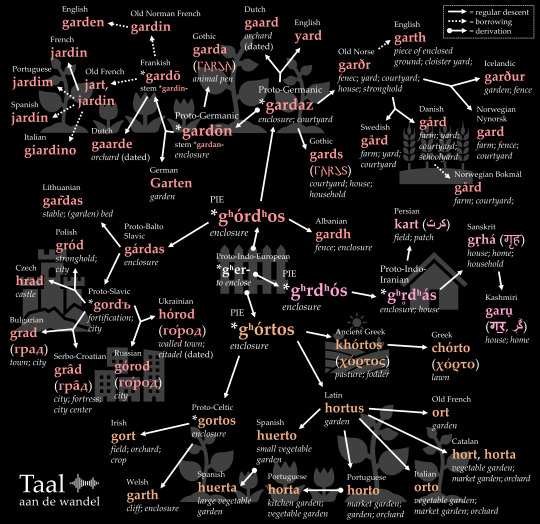
The words yard, garden and garth all stem from one and the same Germanic word. Yard is the native English form, garden took a detour via Old French, and garth was borrowed from Old Norse. These words are also distantly related to Latin hortus (garden), Russian górod (city) and Irish gort (field). Here's more.
#linguistics#historical linguistics#language#etymology#english#latin#french#dutch#german#semantics#proto-indo-european#proto-germanic#proto-balto-slavic#proto-slavic#ancient greek#spanish#portuguese#italian#catalan#irish#welsh#bulgarian#czech#lithuanian#polish#ukrainian#russian#proto-indo-iranian#persian#sanskrit
215 notes
·
View notes
Text
It's not my fault vinland came out in the middle of seven exams i have to take now i have to control my obsession plus study plus finally start posting manga panels that match the episodes and talk about them! Life is truly exhausting
#I have to finish one lesson and then i will write something i have to!!#Bosbnbskbjb>Bosbnbskyjb> Bosbnbskyi>Bosbnbskyy> Bosbnbsky> Bosbnsky> Bosbnski> Bosanski#There are 7 phonological changes that had to happen to get adjective bosnian✝️✝️✝️#I think i should use tumblr for every post i reblog i have to write a proto-slavic word and change it#vinland saga#my beloved❤️❤️❤️
5 notes
·
View notes
Text
Honestly, the russian part of my degree is a lot better than the english part, but I still don't understand, why do we have three separate subjects: first proto-slavic, then old church slavonic, and then the history of the russian language, and not a single subject on the politics of contemporary russia or russian geography or idk... something slightly more useful than doing basically the same subject three times?
#look. i know why we have to know at least the basics of old church slavonic and whatnot but... three times?#i still have to pass proto slavic this year and dear lord am i dreading that...
3 notes
·
View notes